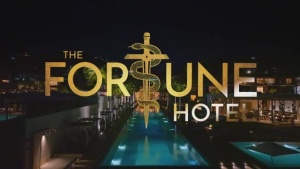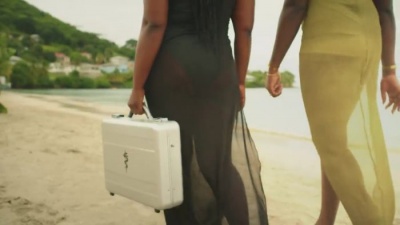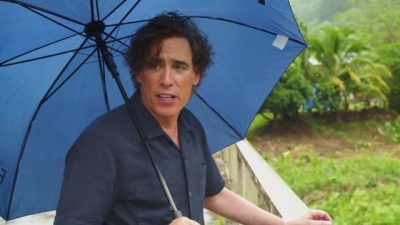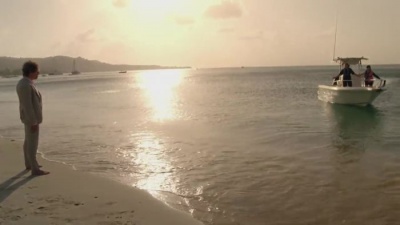The Fortune Hotel
Synopsis
At a luxurious hotel somewhere in the Caribbean, ten pairs of contestants pick one of ten identical briefcases. Inside one briefcase, there is £250,000, and eight are full of blank sheets of paper. One contains the "Early Checkout Card", and whoever's holding that at the end of each day is out of the show. From the third night, whoever's got the money case can pilfer £10,000 out of it each night.
Contestants try to uncover who has which case by playing challenges, one in their room, one out in the area around the hotel. The climax to each show is the nerve-shredding case swap in the hotel bar where each pair must decide whether to keep their case, or swap with someone.
Each episode has three major points. The Room Service Challenge, a task for our players to do while in their rooms. Build a tower out of dominoes. Draw another pair. Pack a suitcase. We get to cut round each of the teams, as they try to achieve the goal and win the task; these are entertaining little tasks, and edited for maximum fun.
Soon enough, a winner emerges. The winning pair have an option: they can swap their own case with someone else's, without knowing what's inside it. Or they can peek into someone else's case, but must keep their own. In the first few episodes, peeks and swaps were done with the knowledge of the other pair; after half way, it was all done secretly, so only the winners knew what they'd done.
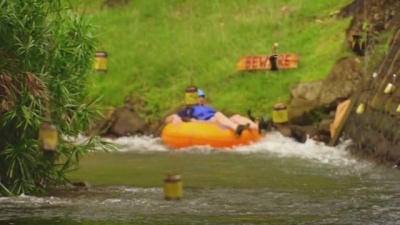 In today's Day Trip Challenge, the contestants try to gather cans as they shoot the rapids in rubber tyres.
In today's Day Trip Challenge, the contestants try to gather cans as they shoot the rapids in rubber tyres.
Eventually, we're going off to the Day Trip Challenge. Literally going off, the contestants board a fleet of minibuses and are driven to their destination. This is a physical activity, shown on screen with plenty of little humour. Throwing coconuts at bottles representing your fellow players, guiding each other through walkie-talkies, and racing around town trying to take various pictures – just some of the activities.
Each challenge gives us a complete ranking of the couples. Sometimes, it'll produce the ranks from the order of finishing – whoever completes the challenge first is the winner, whoever is next comes second and so on. Other times, things are done in groups and the winning group decide amongst themselves what the order is going to be.
This ranking is important for the final part of the day, the Nightcap. All of the couples gather in the hotel bar, bringing their suitcases with them. In order – in the order determined in the Day Trip Challenge – the couples make their decision. They can stick with the case they have. Or they can swap with another couple, hope to grab the money, or foist the card to someone else. Whoever's got the card after this round of swaps is out of the game.
So, this is Chase the Case in a tropical paradise, right?
Wrong. Chase the Case was a fun little daytime game, of earning the right to see partial information. The Fortune Hotel is full of plotting and scheming - the players are free to gather before each challenge, form alliances, work to bring another team down or get their mutual enemies out.
By the middle of the series, pretty much every team knows where the money is, and everyone has a good idea about who is going to be given the "Early Checkout Card" each night. Nobody really twigged that whoever holds that card is in a very powerful position - they're certain to give it away, and can dump it on a team behind them in the Day Trip Challenge.
In style, The Fortune Hotel wanted to be compared to The Traitors, BBC1's mega-hit series. Here, like on The Traitors, viewers know more than any individual couple. The soundtrack was top-notch composed music (another win for Paul Farrer) merged with slowed-down pop covers. Shots were edited to bring about an ambience of fear. We're not sure that the two shows are particularly alike, and maybe it would have been better to let The Fortune Hotel stand on its own merits.
And, in fairness, perhaps players on The Fortune Hotel were too good. There were obvious heroes and obvious villains each night, and very few couples moved from one category to the other. Once formed, alliances proved strong, and lasted until a couple was taken out of the show. The edit wasn't perfect – one of the finalist couples was basically ignored in the first week, never holding the money or the card; another was mostly background for some days. But the producers can only work with what they're given, and made the best out of the limited material.
Viewer reaction was modest: stripped from Monday to Thursday at 9pm for a fortnight told us ITV either has great confidence or wants to bury this show. It was a very slow-burn series, and not a huge amount happened until halfway through. Ratings were also modest, about or just below the slot average.
There's the germ of a good format in there. We needed a bit more chaos – a swap behind the players' backs, or a peek in public just before the nightly swaporama. Maybe this first series was a trial run to polish the rough gem of an idea, and it'll go on to run for ages and make the producers a fortune.
Champions
Jo-Anne and Will, who took £210,000 from the game.
Theme music
Paul Farrer

